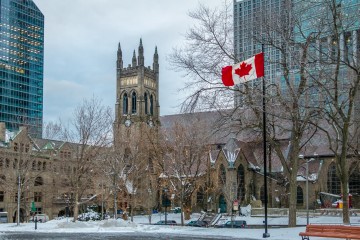
Start your abroad routes journey with us!
Canada Student Visa
Get Admission with Scholarship in top reputed Canadian Universities and Business School
Canada is a popular destination for international students due to its high-quality education system, diverse culture, and welcoming environment.
Here are some reasons why Canada might be a good study destination for you:
| Quality education: | Canada is home to many top-ranked universities and colleges, which offer a wide range of programs at the undergraduate, graduate, and postgraduate levels. | |
|---|---|---|
| Affordable tuition: | Canada has lower tuition fees for international students compared to other countries, such as the United States and the United Kingdom. | |
| Multicultural society: | Canada is a diverse and multicultural society, which makes it a welcoming place for international students. | |
| Safe and welcoming environment: | Canada is known for its safe and friendly communities, which makes it an ideal place to live and study. | |
| Post-study work opportunities: | International students who graduate from a Canadian educational institution may be eligible to work in Canada after they finish their studies. |
If you have any other questions about studying in Canada, feel free to connect with our study abroad experts.
Why should one apply for a Canada Student Visa?
| Access to 31 top-ranked universities globally | |
| Over 175,000 student visas issued by June 2023 | |
| Study scholarships available, with amounts up to CAD 21,000 | |
| Streamlined study permit application process. | |
| Scholarships offered for all courses to international students. | |
| Opportunity to participate in the Postgraduate Work Permit program, allowing 1-3 years of work experience. | |
| Eligibility for Canadian Permanent Residency after completing your studies. | |
| Affordable Education | |
| Quality Educational Curriculum | |
| Innovative Training and Research Opportunities | |
| Best Immigration Possibilities | |
| International Exposure | |
| International students can work while studying. |

Canada offers abundant opportunities for students aspiring to enhance their careers. Individuals from across the globe are flocking to Canada to pursue graduate and postgraduate studies across various specialized fields. With its top-tier education system, prestigious universities, advanced infrastructure, straightforward admission procedures, reasonable tuition costs, and international acclaim, Canada stands out as a prime destination for education. Furthermore, students have the privilege of working and establishing themselves in Canada upon graduation.
Student Visa Types Can be Considered as Below:
| Student Permit: Allows studying in Canadian universities for up to 3 months (Student Direct Stream (SDS) program: Expedited application process for eligible candidates) | |
| Quebec Acceptance Certificate (CAQ): Permit for studying in Quebec colleges. |
If you are looking forward to study in Canada, Abroad Routes is here to help you choose the best university and appropriate course per your requirements.
Validity of Canada Student Visa
A Canadian student visa is typically valid for a duration ranging from 6 months to 5 years, contingent upon the length of the course. Extensions are possible if necessary, and applicants can even apply for visa extensions from India. Intakes in Canada:
Canadian universities present three intakes annually:
Fall Intake: September
Winter Intake: January
Summer Intake: April/May
It's advisable to apply 4 to 6 months ahead of the academic session commencement.
Applying just before the deadline can complicate the admission and scholarship process.
| Higher Study Options | Duration | Intake Months | Deadlines to Apply | |
|---|---|---|---|---|
| Undergraduate Diploma & Advanced Diploma | 2 Years | September, January & May | Maximum within 4-6 months | |
| Advanced Diploma | 3 years | September, January & May | Maximum within 4-6 months | |
| Bachelors | 4 Years | September, January & May | Maximum within 4-6 months | |
| PG Diploma/Graduation Certificate | 8 months- 2 years | September, January & May | Maximum within 4-6 months | |
| Masters (MS/MBA) | 2 Years | September, January & May | Maximum within 4-6 months |
Admission Requirements
Admission requirements for international students vary depending on the institution and program of study.
In addition to the general requirements, individual programs may have additional requirements such as portfolios, letters of recommendation, or specific academic qualifications. It is important to check with the institution and program of your choice to determine their specific requirements
Cost of Studying in Canada
The cost of studying in Canada for international students can vary widely depending on a number of factors, including the institution and program of study, location, and personal expenses. Some estimates put the average cost of tuition and living expenses for international students at around $30,000 per year, although this can be higher or lower depending on the specific circumstances.
Tuition fees for international students in Canada are generally higher than those for domestic students. The cost of tuition can vary widely depending on the program of study, with some programs costing more than others. For example, programs in business, engineering, and the natural sciences tend to be more expensive than those in the humanities or social sciences.
In addition to tuition fees, international students will also need to budget for living expenses such as housing, food, and transportation. These costs can also vary depending on the location and personal lifestyle of the student.
It is important to note that international students in Canada may be eligible for financial assistance, such as scholarships, bursaries, and loans, to help cover the cost of their studies. It is worth exploring these options as you plan your finances for studying in Canada.
Tuition fees at Canadian universities fluctuate from one institution to another. Students can consult the official website of their chosen university for detailed fee structures. We've provided approximate fee ranges for various courses as a reference.
| Study Program | Average Annual Fees in CAD | |
|---|---|---|
| Undergraduate Program | 13,000 to 20,000 | |
| Postgraduate/Masters' program | 17,000 to 25,000 | |
| Doctoral Degree | 7,000 to 15,000 |
Canada Student Visa Fee
As per the CIC (Citizenship and Immigration Canada), the Canada Student Visa Fee is 150 CAD-200 CAD.
Scholarship Opportunities in Canada
There are many scholarships available to international students studying in Canada, provided by a variety of sources such as government agencies, educational institutions, and private organizations. Some scholarships are specific to certain countries, programs of study, or fields of research, while others are open to all international students.
Here are a few examples of scholarships that may be available to international students in Canada:
Government of Canada Scholarships
The Canadian government offers a range of scholarship programs for international students, including the Vanier Canada Graduate Scholarships and the Banting Postdoctoral Fellowships.
Institution-specific scholarships
Many universities and colleges in Canada offer scholarships specifically for international students. These may be based on academic merit, financial need, or other criteria.
Private scholarships
There are many private organizations that offer scholarships to international students studying in Canada. These can be found through a simple online search or by contacting the organization directly.
It is worth noting that scholarship opportunities can be competitive, and it is important to research and apply for scholarships well in advance of your intended start date. You can find more information about scholarships for international students in Canada by contacting the institution or program you are interested in, or by conducting an online search for scholarship opportunities.

How to apply for a Canada Student Visa?
| Step 1: Check your eligibility for a Canada student visa. | |
| Step 2: Arrange the checklist of documents. | |
| Step 3: Apply for the visa online. | |
| Step 4: Wait for the status. | |
| Step 5: Fly to study in Canada. |
Canada Study Visa Processing Time:
The processing time for a Canada student visa typically ranges from 2 to 16 weeks. The processing time for a Canada student visa begins once the application reaches the relevant authority for approval. Several factors can affect this processing time, including:
| The type of application submitted to authorities. | |
| Completion of all necessary documents and information. | |
| Volume of applications received by the visa authority. | |
| Potential delays or rejections based on the applicant's criminal record. | |
| Travel bans imposed by the country. | |
| Political changes in power. |

QS World University Rankings – Top Universities in Canada
| #26 | University of Toronto | |
| #27 | McGill University | |
| #46 | University of British Columbia | |
| #111 | Université de Montréal | |
| #126 | University of Alberta | |
| #140 | McMaster University | |
| #149 | University of Waterloo | |
| #170 | Western University | |
| #230 | University of Ottawa |
| #235 | University of Calgary | |
| #240 | Queen's University at Kingston | |
| #272 | Dalhousie University | |
| #298 | Simon Fraser University | |
| #334 | University of Victoria (UVic) | |
| #414 | Université Laval | |
| #458 | University of Saskatchewan | |
| #494 | York University | |
| 521-530 | Concordia University |
| 581-590 | University of Guelph | |
| 591-600 | Université du Québec | |
| 601-650 | Carleton University | |
| 601-650 | University of Manitoba | |
| 651-700 | University of New Brunswick | |
| 701-750 | University of Windsor | |
| 751-800 | Memorial University of Newfoundland | |
| 751-800 | Université de Sherbrooke | |
| 801-1000 | Ryerson University |

Post-Study Work Permit Options in Canada
Canada provides post-study work permit options for international students seeking to remain and work in the country. The Immigration, Refugees and Citizenship Canada (IRCC) administers the Post-Graduation Work Permit (PGWP) program, permitting international graduates to work in Canada for up to 3 years.
| Under the PGWP program, international students can work for any Canadian employer across various industries. | |
| Those completing courses lasting less than 2 years can work for a duration equivalent to their study period under the PGWP. | |
| Students completing courses of two years, or more are eligible for a three-year post-study work permit. |
Visa Requirement to Study in Canada
As an international student, you will need to obtain a study permit in order to study in Canada. In order to apply for a study permit, you will need to provide the following documents:
| A valid passport or travel document | |
| A letter of acceptance from a recognized institution in Canada | |
| Evidence of sufficient financial resources to cover tuition and living expenseswhile in Canada | |
| A police certificate of good conduct (depending on your country of origin and length of stay in Canada) | |
| Proof of medical insurance |
You may also need to provide additional documents depending on your specific circumstances. It is important to carefully review the requirements and gather all necessary documents before applying for a study permit.
You can apply for a study permit online or at a Canadian embassy, consulate, or high commission. Processing times for study permit applications can vary, so it is important to apply well in advance of your intended start date.
Once you have been accepted to a recognized institution in Canada and have received your study permit, you will also need to apply for a temporary resident visa if you plan to travel to Canada. This visa is usually issued at the same time as your study permit.
It is important to note that study permits are specific to the institution and program of study indicated on the permit. If you change institutions or programs, you may need to apply for a new study permit.
